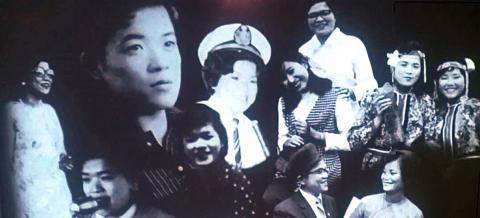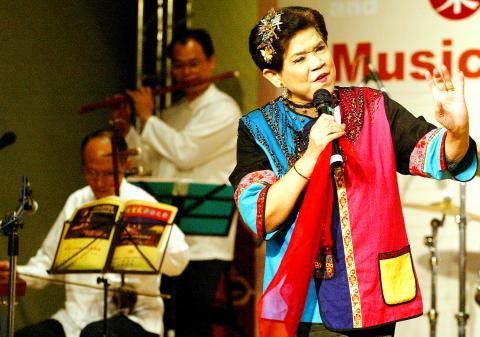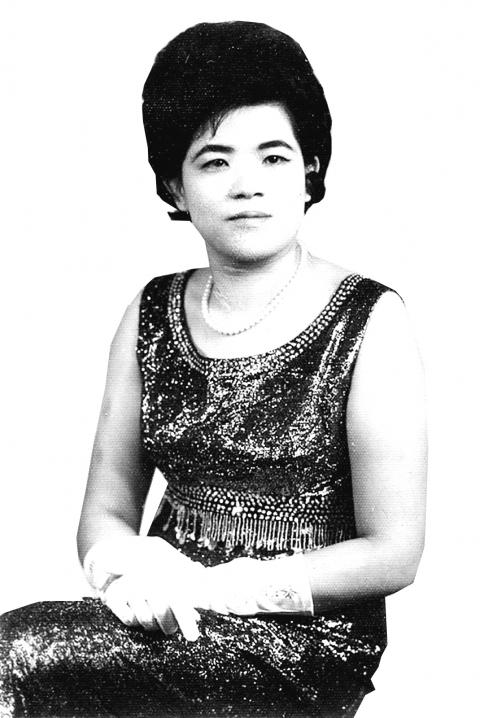Jan. 15 to Jan. 21
Lai Pi-hsia (賴碧霞) learned enough Atayal to communicate with her peers while growing up in the Aboriginal village of Chingchuan (清泉) in Hsinchu County, but she still had trouble fully understanding their songs.
One day, she heard a different tune that spoke to her in a way she could not explain. And she could understand all the words and sing along. She ran into the construction site where the voice was coming from and asked the workers what song it was. They laughed and told her it was a Hakka mountain song. With Hakka being her native tongue, Lai immediately understood why the songs sounded familiar.

Photo: Lee Jung-ping, Taipei Times
“After that, I asked about every song I heard and tried to learn from every person I encountered,” she writes in her book, Taiwan’s Hakka Mountain Songs (台灣客家山歌). She even walked across the mountains for three days to learn the art of writing lyrics from an illiterate maestro.
From then on, Lai not only dedicated her life to singing, collecting, recording, promoting and teaching Hakka mountain songs, she also wrote plenty of other material ranging from television shows to comedy performances to three-character, tea-picking dramas (三腳採茶戲), another Hakka specialty.
By the time of her death on Jan. 18, 2015, Lai had recorded more than 50 albums and had written more than 20 scripts for various productions, writes Chen Yi-chun (陳怡君) in the book Lai Pi-hsia and Her World of Hakka Folk Music (賴碧霞與她的客家民歌天地).

Photo: Wang Yi-sung, Taipei TImes
WHAT MAKES A SONG ‘MOUNTAIN’
Chen writes that Hakka mountain songs were first brought to Taiwan from China by Han Chinese settlers in the 17th century. “Singing mountain songs while picking tea” was a quintessential image of rural Hakka life as music helped alleviate the drudgery of hard labor.
“Initially, it was likely a way for people who liked to sing to entertain themselves and others up in the mountains,” Chen writes. As more Hakka settled in the Taoyuan, Hsinchu and Miaoli areas, mountain songs became a mainstream form of entertainment.

Photo courtesy of Wikimedia Commons
These songs evolved in Taiwan and became increasingly improvisational. Since they were only passed on orally, the lyrics changed with the times. Cautionary songs, ballads and playful attacks were among the themes covered. Lai adds that during Japanese rule, many songs expressed their hatred for the colonizers.
“The singers skillfully adapted the lyrics to the time, place, person and event,” Lai writes. “Other singers can also arbitrarily respond to the lyrics. That’s why Hakka mountain songs can capture people’s hearts — you can listen to the same song 100 times and not feel bored.”
Hakka mountain songs, along with other forms of Han Chinese culture, were banned during the later years of the Japanese era. They thrived again during the early days of Chinese Nationalist Party (KMT) rule, but soon loss popularity with the arrival of modern music.
PERSISTENT STUDENT
Lai was born in 1932 in today’s Jhudong (竹東) Township in Hsinchu County. Her first musical love was the Japanese songs that she heard on her uncle’s phonograph, and she was encouraged by her Japanese teacher to pursue singing.
In 1947, her father retired from Chingchuan and moved the family back to Jhudong, where there was a higher concentration of Hakka speakers. Lai wanted to learn from folk music master Kuan Lo-cheng (官羅成), but he did not accept students. A persistent Lai befriended Kuan’s wife by washing clothes with her every day by the river, and eventually she was able to persuade Kuan to teach Lai.
Kuan specialized in the melodies but not the lyrics, which led to Lai walking three days across the mountains to visit Lai Ting-han (賴庭漢). The illiterate Lai Ting-han would sing the lyrics and Lai Pi-hsia would write them down phonetically in Japanese and bring them to a Chinese teacher for translation.
Since there was not much printed material about Hakka mountain songs, Lai began actively collecting lyrics this way. By the time she was 20 years old, she had established herself in Hakka circles as a performer.
In 1954, Lai got a job as a traveling advertisement announcer, touring the country twice in two years primarily to promote Ve Wong Corp’s (味王) monosodium glutamate and Taiwan Morinaga’s (森永) milk formula. Fluent in Mandarin, Hoklo (also known as Taiwanese), Hakka, Japanese and Atayal, she was able to sing to audiences wherever she went, becoming a hot commodity in the industry. She started making records and writing her own music shortly afterward, and later worked as a host for various local radio stations, where she started penning Hakka radio dramas — several of which she acted in, produced and directed.
Her career blossomed from there, and in 1973 she wrote the screenplay for Taiwan’s first Hakka feature film, Tea Mountain Love Song (茶山情歌). She retired that same year and dedicated the rest of her life to teaching and researching Hakka mountain songs.
Lai was critical of those teachers who ignored the improvisational nature of Hakka mountain songs, calling it “singing a song to death.”
“Whenever someone’s song wins a contest, everyone will start singing that exact same song and forget the fact that it’s supposed to be improvisational. Before, I would sing one verse and the other person would respond, going back and forth for up to three days. Now it’s all gone stale.”
Lai writes about her desire to preserve Hakka folk music in her 1983 book: “Now society is filled with the decadence of Western, [Japanese and local] pop music, and the people who are interested in folk music are often not Hakka so they do not understand the nuances in the rhyming and phrases with double meanings. That’s why I will make available all that I’ve learned.”
Taiwan in Time, a column about Taiwan’s history that is published every Sunday, spotlights important or interesting events around the nation that have anniversaries this week.

Three big changes have transformed the landscape of Taiwan’s local patronage factions: Increasing Democratic Progressive Party (DPP) involvement, rising new factions and the Chinese Nationalist Party’s (KMT) significantly weakened control. GREEN FACTIONS It is said that “south of the Zhuoshui River (濁水溪), there is no blue-green divide,” meaning that from Yunlin County south there is no difference between KMT and DPP politicians. This is not always true, but there is more than a grain of truth to it. Traditionally, DPP factions are viewed as national entities, with their primary function to secure plum positions in the party and government. This is not unusual

Mongolian influencer Anudari Daarya looks effortlessly glamorous and carefree in her social media posts — but the classically trained pianist’s road to acceptance as a transgender artist has been anything but easy. She is one of a growing number of Mongolian LGBTQ youth challenging stereotypes and fighting for acceptance through media representation in the socially conservative country. LGBTQ Mongolians often hide their identities from their employers and colleagues for fear of discrimination, with a survey by the non-profit LGBT Centre Mongolia showing that only 20 percent of people felt comfortable coming out at work. Daarya, 25, said she has faced discrimination since she

April 21 to April 27 Hsieh Er’s (謝娥) political fortunes were rising fast after she got out of jail and joined the Chinese Nationalist Party (KMT) in December 1945. Not only did she hold key positions in various committees, she was elected the only woman on the Taipei City Council and headed to Nanjing in 1946 as the sole Taiwanese female representative to the National Constituent Assembly. With the support of first lady Soong May-ling (宋美齡), she started the Taipei Women’s Association and Taiwan Provincial Women’s Association, where she

More than 75 years after the publication of Nineteen Eighty-Four, the Orwellian phrase “Big Brother is watching you” has become so familiar to most of the Taiwanese public that even those who haven’t read the novel recognize it. That phrase has now been given a new look by amateur translator Tsiu Ing-sing (周盈成), who recently completed the first full Taiwanese translation of George Orwell’s dystopian classic. Tsiu — who completed the nearly 160,000-word project in his spare time over four years — said his goal was to “prove it possible” that foreign literature could be rendered in Taiwanese. The translation is part of